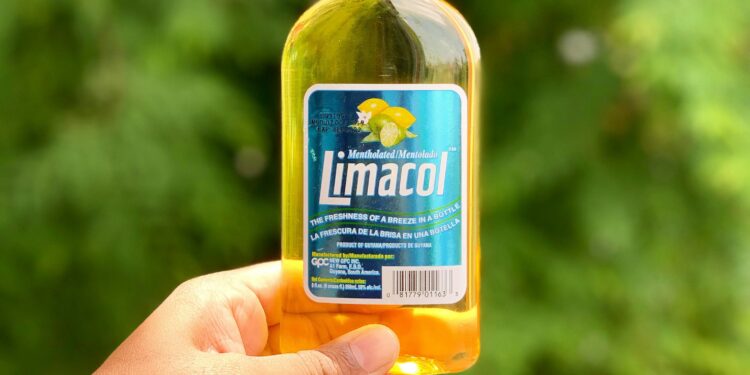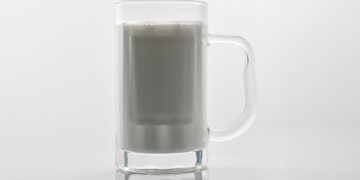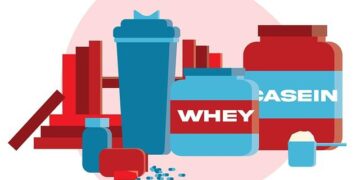Table of Contents
Part 1: The Burnout and the Breakthrough: Why Most Supplement Advice Fails
Narrative Introduction: My Personal Struggle with Cognitive Burnout
As a medical researcher, my mind is my most critical tool.
The pressure is relentless—grant deadlines, complex data analysis, the constant need to stay abreast of a torrent of new publications.
For years, I thrived on it.
But then, slowly at first, and then all at once, the engine began to sputter.
It started as a subtle haze, a “brain fog” that made complex papers feel impenetrable.
Soon, the mental fatigue was profound; my focus, once a laser, was now a flickering candle.
My work, my passion, was becoming a source of immense frustration.
Determined to find a solution, I turned to the world of nootropics, and L-Tyrosine quickly surfaced as a top contender.
The online articles were seductive, full of promises of enhanced focus, memory, and mental performance.
I followed the standard advice, buying a popular brand and taking it as directed.
The results were a maddeningly inconsistent rollercoaster.
Some days, I felt a slight lift, a fleeting moment of clarity.
Other days, I felt nothing at all.
Worse, there were days I felt an unsettling agitation, a low-grade irritability that was completely out of character.
This experience mirrored findings from a study on military personnel under severe stress, where L-Tyrosine, instead of calming them, significantly increased feelings of anger.1
On other occasions, I was simply left with a dull headache and mild nausea, common side effects that many users report.2
I was stuck in a cycle of hope and disappointment.
I was following the rules, but the “standard advice” was clearly failing me.
It felt like I was buying a lottery ticket with each dose, hoping for a win but usually coming up empty.
This approach was antithetical to my entire professional life, which is built on understanding systems, mechanisms, and root causes.
The Epiphany: The “Biochemical Production” Analogy
The breakthrough didn’t come from a new supplement, but from a fundamental shift in perspective.
Frustrated, I stepped back and viewed the problem not as a consumer, but as the researcher I am.
I realized I was treating my own neurochemistry with a shocking lack of rigor.
I was just throwing an ingredient at a complex system and hoping for the best.
That’s when the analogy hit me, and it changed everything.
I began to see supplementation not as buying a single product, but as casting, staging, and directing a complex biochemical production.
This mental model became my new framework, and it’s the one I want to share with you.
In this production:
- The Star is the main ingredient you’re interested in—in this case, L-Tyrosine. It has a specific role to play.
- The Supporting Cast are the essential cofactors—vitamins and minerals that the star needs to perform its role effectively. Without them, the star is left stranded on stage.
- The Script is the correct dosage and timing. Giving the star the wrong lines or the wrong cue renders their performance ineffective.
- The Stage is the product itself and your own body. The stage must be clean and safe (a pure, verified product) and ready for the performance (a body free from contraindications).
- The Director is you. Armed with a full understanding of the entire system, you are no longer a passive audience member hoping for a good show. You are in control, making informed decisions to ensure a flawless performance.
This guide is designed to take you from being a confused consumer to an informed director.
We will deconstruct this entire production, piece by piece, so you can understand not just what to take, but why it works, how it works, and how to ensure you get the results you’re looking for, every single time.
Part 2: Casting the Star: A Deep Dive into L-Tyrosine’s True Role
The Star’s Audition: What L-Tyrosine Actually Does
Before casting any star, a director must understand their role.
L-Tyrosine is a non-essential amino acid, meaning the body can typically synthesize it from another amino acid, phenylalanine.3
Its most celebrated role in our “biochemical production” is serving as the raw material, the direct precursor, for a critical class of neurotransmitters called catecholamines: dopamine, norepinephrine (also called noradrenaline), and epinephrine (also called adrenaline).5
These brain chemicals are the lead actors in regulating your mental state.
- Dopamine is central to motivation, reward, and focus.
- Norepinephrine and Epinephrine are key players in alertness, concentration, and the body’s “fight-or-flight” response to stress.8
When you understand that L-Tyrosine is the starting block for this entire chemical cascade, its potential becomes clear.
But potential is not the same as guaranteed performance.
The context of its performance is everything.
When the Star Shines: The Critical Importance of Stress
This is the single most misunderstood aspect of L-Tyrosine supplementation and the primary reason my initial efforts—and those of countless others—failed.
I was taking it on normal, low-stress days, expecting it to act like an “engine upgrade” for my brain.
The science, however, tells a very different story.
L-Tyrosine is a “Reservoir Refiller,” Not an “Engine Upgrade.”
The synthesis of catecholamines from tyrosine is a tightly regulated process.
Under normal, calm conditions, the availability of tyrosine is not the limiting factor.
Your brain has enough on hand to maintain baseline function.
However, when you encounter acute stress—be it physical, psychological, or environmental—your catecholamine-releasing neurons fire at a much higher rate.5
This rapid firing depletes your reserves of norepinephrine and dopamine, leading to the very symptoms of burnout I experienced: impaired memory, reduced attention, and mental fatigue.9
This is where L-Tyrosine gets its cue.
It is only when these neurotransmitter stores are being rapidly drained that supplemental tyrosine can step in to replenish the supply and support continued synthesis.5
Its effects are system-specific and only present when needed, when a localized deficiency state exists due to stress.5
The scientific evidence is remarkably consistent on this point.
L-Tyrosine has been shown to prevent or mitigate cognitive decline caused by a variety of acute stressors:
- Cold Stress and Hypoxia: A double-blind, placebo-controlled study found that a 100 mg/kg dose of tyrosine significantly decreased symptoms, adverse moods, and performance impairments in subjects exposed to cold and low oxygen for 4.5 hours.10 Another study showed it reversed memory losses induced by cold stress.11
- Military Combat Training: In a demanding military training course, cadets given tyrosine performed better on memory and tracking tasks compared to a placebo group.6
- Sleep Deprivation: A single 150 mg/kg dose of tyrosine was able to attenuate the decline in cognitive and motor performance associated with a full night of sleep loss, helping subjects stay alert for about three hours longer than they otherwise would have.9
- Mentally Demanding Tasks: In a study of 22 women, tyrosine significantly improved working memory during a challenging cognitive task compared to a placebo.9
Conversely, the research is equally clear that L-Tyrosine does not enhance mental performance or memory from a resting baseline in the absence of a stressor.6
It won’t increase your brainpower on a calm day.
This distinction is crucial.
It explains why my results were so erratic.
Taking L-Tyrosine is not about upgrading your cognitive engine; it’s about ensuring your neurotransmitter fuel tank doesn’t run empty during periods of high demand.
It is a tool for stress resilience, preserving your mental capacity when you are under pressure.
Choosing the Right Star: L-Tyrosine vs. N-Acetyl L-Tyrosine (NALT)
Once you understand the star’s role, you must cast the right actor.
In the world of tyrosine supplements, you’ll frequently encounter two forms: standard, free-form L-Tyrosine and a more expensive, modified version called N-Acetyl L-Tyrosine (NALT).
NALT is often marketed as a superior form.
The theory is that the addition of an acetyl group makes it more water-soluble, which should lead to better absorption in the gut.13
This sounds plausible, but it highlights a critical lesson for any supplement “director”: plausible chemistry does not always translate to real-world biological effectiveness.
Higher Cost and Fancy Chemistry Don’t Equal Better Results.
While NALT is indeed more soluble, the key metric is bioavailability—how much of the compound actually reaches the bloodstream and is available for the brain to use? Here, the evidence is surprisingly clear: NALT falls short.
Research has shown that a significant portion of ingested NALT is excreted in the urine before the body can convert it back into usable L-Tyrosine.13
Studies comparing the two forms directly have found that NALT does not raise blood levels of tyrosine as effectively as standard L-Tyrosine.13
This means that despite being significantly more expensive due to the extra chemical processing required to create it, NALT is actually the less effective and less economical choice for the job.13
This is a powerful, money-saving piece of information that cuts through marketing hype.
For our biochemical production, the clear, evidence-based choice for the starring role is standard, free-form L-Tyrosine.
| Feature | L-Tyrosine | N-Acetyl L-Tyrosine (NALT) |
| Bioavailability | Higher. More effectively raises blood tyrosine levels. | Lower. A significant portion is excreted before conversion. |
| Conversion Efficiency | Already in the usable form required by the brain. | Must be converted back to L-Tyrosine in the body, an inefficient process. |
| Scientific Support | Strong evidence from numerous human studies showing efficacy under stress. | Lacks strong evidence for raising blood tyrosine levels effectively compared to L-Tyrosine. |
| Cost | More economical and cost-effective. | Significantly more expensive due to additional processing. |
| Expert Recommendation | The superior, evidence-based choice. | Not recommended due to lower bioavailability and higher cost. |
Part 3: Assembling the Supporting Cast: The Overlooked Importance of Cofactors
The Director’s Note: A Star Is Only as Good as Their Support
A brilliant actor delivering a monologue in an empty, dark room is a wasted talent.
A star shines brightest when supported by a talented cast, proper lighting, and sound.
In our biochemical production, L-Tyrosine is the star, but it cannot perform its role of creating dopamine and norepinephrine alone.
It relies on a “supporting cast” of enzymatic cofactors.
Ignoring them is like hiring a movie star and forgetting to hire the camera crew.
This was another critical flaw in my initial approach and a common mistake for many consumers.
The conversion of L-Tyrosine into its powerful neurotransmitter products is a multi-step assembly line.
If a key worker—a cofactor—is missing at any point, the entire production grinds to a halt.
The First Conversion: The Role of Vitamin B6 in Dopamine Synthesis
The first major act of our production is the conversion of L-Tyrosine into dopamine.
The pathway looks like this:
L-Tyrosine → (via Tyrosine Hydroxylase) → L-DOPA → (via Aromatic L-amino acid decarboxylase) → Dopamine
The critical enzyme in that final step, Aromatic L-amino acid decarboxylase (sometimes called dopa decarboxylase), is entirely dependent on a specific supporting actor: Vitamin B6, in its biologically active form, pyridoxal 5′-phosphate (PLP).14
A Missing Cofactor Breaks the Production Chain.
You can flood your system with L-Tyrosine, but if you are deficient in Vitamin B6, you create a bottleneck in the assembly line.
The production of L-DOPA may proceed, but the conversion to dopamine will be sluggish and inefficient.
Research in animal models demonstrates this clearly: a Vitamin B6 deficiency leads to significantly lower activity of dopa decarboxylase and a subsequent, measurable loss of dopamine in the brain.15
This means that supplementing with L-Tyrosine in isolation, without ensuring adequate Vitamin B6 status, is a fundamentally flawed strategy.
It’s like delivering raw materials to a factory where the main machine is powered down.
Many reputable supplement manufacturers understand this biochemical synergy and include Vitamin B6 in their L-Tyrosine formulas specifically to “aid in utilization”.16
A smart director ensures the entire cast is present for the performance.
The Second Conversion: The Role of Vitamin C in Norepinephrine Synthesis
The production isn’t over once dopamine is created.
For many of the desired effects on alertness and stress response, dopamine must be converted into norepinephrine.
This is the final act, and it requires its own specialized supporting cast member.
The pathway continues:
Dopamine → (via Dopamine β-hydroxylase) → Norepinephrine
The enzyme for this final, crucial conversion, dopamine β-hydroxylase (DβH), is located inside neurosecretory vesicles and is absolutely dependent on Vitamin C (ascorbic acid) to function.
Vitamin C acts as the essential electron donor that powers this reaction.18
Vitamin C is the “Power Supply” for the Final Act.
The body intuitively understands the importance of Vitamin C for this process.
The highest concentrations of Vitamin C in the entire body are found in the brain and adrenal glands—precisely where this catecholamine synthesis takes place.18
Without sufficient Vitamin C, the activity of the DβH enzyme is low, and the conversion of dopamine to norepinephrine falters.20
Studies on neuronal cells have shown that even modest, physiologic concentrations of Vitamin C can rapidly and efficiently stimulate the synthesis of norepinephrine from dopamine.19
Its role is so critical that it’s considered the primary and physiologic electron donor for the DβH enzyme.19
Furthermore, Vitamin C plays a dual role.
It not only powers the final conversion to norepinephrine but also supports the very first step of the entire process by helping to recycle tetrahydrobiopterin, a cofactor for the initial enzyme, tyrosine hydroxylase.20
It also acts as a potent antioxidant, protecting the neuronal machinery from oxidative stress that can be generated during this high-energy production process.19
A supplement formula that includes Vitamin C alongside L-Tyrosine, such as the one offered by Neighborhood Naturopathic 4, demonstrates a sophisticated, systems-level understanding of this entire biochemical pathway.
It ensures that the director has not only cast the star but has also hired the full supporting cast and turned on the power for the entire stage.
Part 4: Setting the Stage: Purity, Dosage, and Third-Party Verification
The Wild West: Navigating the Unregulated Supplement Market
Every director knows that the quality of the stage is as important as the quality of the actors.
A brilliant performance can be ruined by a faulty set or bad lighting.
In the world of dietary supplements, the “stage” is the physical product you consume, and unfortunately, the quality of that stage can vary dramatically.
In the United States, the Food and Drug Administration (FDA) does not approve dietary supplements for safety and efficacy before they are marketed.2
This regulatory landscape is often called the “Wild West” because it places the primary burden of ensuring quality and safety on the manufacturer.
It also places a significant burden of diligence on you, the consumer.
Studies have found that some marketed supplements can be contaminated with everything from toxic heavy metals to unlisted pharmaceutical drugs.2
This reality makes independent, third-party verification not a luxury, but an absolute necessity.
It is the only way to be certain that the stage for your biochemical production is professional, clean, and safe.
The Director’s Script: Evidence-Based Dosing
With the cast and stage in place, the director must provide the script: the correct dosage and timing.
Getting this wrong can render the entire production ineffective.
The most robust human studies that demonstrated L-Tyrosine’s ability to combat cognitive decline under stress used acute (single) doses calculated by body weight.
The effective range was consistently 100-150 milligrams per kilogram of body weight.6
Let’s translate that into practical numbers:
- For a 150-pound (68 kg) person, this equates to a dose of 6,800 mg to 10,200 mg (or 6.8 to 10.2 grams).
- For a 200-pound (91 kg) person, this equates to a dose of 9,100 mg to 13,650 mg (or 9.1 to 13.6 grams).
These are very large doses, far greater than what is found in a typical one- or two-capsule serving.
In these studies, the dose was typically administered 30 to 60 minutes before the anticipated stressful event.21
For general use, most supplement brands and anecdotal reports suggest a much lower dose, typically in the range of 500 mg to 2,000 mg per day.21
Dosing Recommendation: Given the potential for side effects, it is prudent to start with a lower dose (e.g., 500 mg to 1,000 mg) to assess your individual tolerance.
If you are planning to use it for a specific, acute stressor (like an important exam, a public speaking engagement, or a physically demanding event), you might consider using a higher, evidence-based dose, but only after you’ve confirmed you tolerate the supplement well at lower amounts.
Timing is Critical: To ensure your star actor makes it to the stage without getting lost in the crowd, L-Tyrosine should be taken on an empty stomach or at least two hours away from a protein-containing meal.4
This is because L-Tyrosine is a large neutral amino acid (LNAA) and must compete with other LNAAs from dietary protein for transport across the blood-brain barrier.
Taking it with protein diminishes its ability to reach the brain effectively.
The Seal of Quality: Decoding NSF and USP Certifications
In an unregulated market, how can a director be sure the stage is safe? You look for the seal of a trusted, independent inspector.
In the supplement industry, the two most rigorous and respected third-party certification bodies are NSF International and the United States Pharmacopeia (USP).
These certifications are the only objective measure of a safe and accurately labeled product.
- NSF International (NSF/ANSI 173): When you see the NSF mark, it means the product has undergone a rigorous, multi-step process. NSF has verified that what’s on the label is actually in the bottle, in the correct amounts. They have tested the product for harmful levels of contaminants like heavy metals, pesticides, and microbes. They have also audited the manufacturing facility to ensure it complies with the FDA’s Good Manufacturing Practices (GMP).22
- NSF Certified for Sport®: This is an even higher level of certification, critical for athletes but valuable for any discerning consumer. In addition to the standard NSF requirements, products with this seal are screened for more than 290 substances banned by major athletic organizations, including stimulants, narcotics, and steroids.23 This provides the ultimate assurance that the product is free from undeclared and potentially harmful adulterants. Brands like Momentous and Thorne heavily leverage this certification to signal uncompromising quality.26
- USP Verified: The USP Verified Mark provides a similar level of assurance. It confirms that the product contains the ingredients listed on the label, in the declared potency and amounts; does not contain harmful levels of specified contaminants; will break down and release into the body within a specified amount of time; and has been made according to FDA and USP Good Manufacturing Practices.28 USP has been setting public standards for medicines for over 200 years, making its mark a powerful symbol of quality and trust.
A product bearing one of these seals has voluntarily submitted itself to a stringent, ongoing audit.
It is the clearest indicator that a manufacturer is committed to quality and transparency.
It is the difference between an amateur stage production and a professional one ready for Broadway.
| Certification | What It Verifies | Key Features |
| NSF Contents Certified | Product contains what the label claims; no harmful levels of contaminants; manufactured in a GMP facility. | Annual audits and periodic retesting of products. Based on the American National Standard for dietary supplements (NSF/ANSI 173). |
| NSF Certified for Sport® | All of the above, PLUS screening for 290+ substances banned in sports (e.g., stimulants, steroids). | Recognized by the NFL, MLB, PGA, and the U.S. Anti-Doping Agency. The gold standard for athletes and safety-conscious consumers. |
| USP Verified | Product contains what the label claims (potency & amount); no harmful contaminants; will dissolve properly; made in a GMP facility. | Backed by the 200-year history of the United States Pharmacopeia. Includes off-the-shelf testing of verified products. |
| GMP Certified | The manufacturing facility adheres to Good Manufacturing Practices for quality and safety. | Audits the process and facility, but does not test or verify the final product itself. It is a foundational requirement for NSF and USP certification. |
Part 5: Knowing the Audience: Safety, Side Effects, and Your Unique Biology
Every “Audience” is Different: The Importance of Bio-Individuality
A director can assemble the perfect cast, script, and stage, but if the show isn’t right for the audience, it will fail.
In our analogy, the “audience” is your unique body, with its specific genetics, age, health status, and biochemistry.
A production that earns rave reviews from one person might be a complete flop for another.
This is the principle of bio-individuality, and it is paramount for safe and effective supplementation.
Potential Side Effects and Nuances
While generally considered safe for short-term use, L-Tyrosine is not without potential side effects.
The most commonly reported are relatively mild and include nausea, heartburn, headache, and fatigue.2
However, there are more complex reactions to consider.
Replenishing Neurotransmitters Can Have Unexpected Emotional Effects.
The study conducted at the U.S. Air Force’s Survival, Evasion, Resistance, and Escape (SERE) school provides a fascinating and critical window into this complexity.1
Researchers subjected military students to the severe psychological stress of mock captivity and interrogation.
They hypothesized that L-Tyrosine would buffer against the negative mood effects.
The results were surprising.
While L-Tyrosine had no significant effect on tension, depression, or fatigue, it caused a statistically significant
increase in anger compared to the placebo group.1
This finding is profound.
It suggests that simply “refilling the tank” of arousal-based neurotransmitters like norepinephrine isn’t a blunt instrument for “feeling better.” Under conditions of extreme stress and provocation, it may actually amplify certain high-arousal emotional states.
This provides a scientific explanation for the agitation I and others have anecdotally experienced.
It is a crucial nuance that demonstrates the powerful effects these precursors can have on our emotional landscape.
The Age Factor: A Warning for Older Adults
The assumption that a supplement that works for a young adult will work the same way for an older adult is a dangerous one.
The brain’s neurochemistry changes significantly as we age, and this can dramatically alter the outcome of a supplement.
L-Tyrosine’s Effects Can Reverse with Age.
A landmark 2018 study used functional MRI (fMRI) to examine the effects of L-Tyrosine on the brains of healthy older adults (aged 61–72).31
The findings were a stark warning.
Compared to a placebo, L-Tyrosine had a
detrimental effect on a cognitive function known as proactive inhibition (the ability to prepare to stop an action).
The study found that with increasing age, L-Tyrosine decreased the associated activity in key brain regions like the fronto-striatal network.31
The researchers’ conclusion was unambiguous: L-Tyrosine’s effects on cognition “became detrimental with increasing age, questioning the cognitive enhancing potential of tyrosine in healthy aging”.31
This is likely because the aging brain already has altered dopamine functioning.
Adding a precursor to this delicately balanced but altered system may cause further disruption rather than beneficial restoration.
This is a vital, safety-critical piece of information that underscores why a one-size-fits-all approach to supplementation is reckless.
Critical Contraindications: When to Avoid L-Tyrosine
For some individuals, taking L-Tyrosine is not advisable under any circumstances.
These contraindications are non-negotiable.
- Thyroid Conditions: Your body uses tyrosine and iodine to produce thyroid hormones (T3 and T4).8 If you have an overactive thyroid (hyperthyroidism) or an autoimmune thyroid condition like Graves’ disease, taking supplemental tyrosine could theoretically increase thyroid hormone production to dangerous levels, worsening your condition.2
- Medication Interactions:
- MAO Inhibitors: L-Tyrosine is strictly contraindicated for individuals taking Monoamine Oxidase (MAO) inhibitor antidepressant medications. This combination can lead to a hypertensive crisis, a sudden and severe increase in blood pressure.32
- Levodopa: If you are taking Levodopa (L-DOPA) for Parkinson’s disease, supplemental tyrosine can compete with it for absorption in the gut and transport into the brain, potentially reducing the medication’s effectiveness.2
- Thyroid Medication: If you are taking thyroid hormone replacement medication (e.g., levothyroxine), you should not take L-Tyrosine without consulting your physician, as it could interfere with your hormone levels.2
Always consult with a healthcare practitioner before beginning any new supplement, especially if you have a pre-existing medical condition or are taking any prescription medications.
Part 6: The Final Review: Applying the Framework to Top L-Tyrosine Brands
The Director’s Cut: Evaluating the Market
Now it’s time for the director’s cut.
We will take our “Biochemical Production” framework and apply it to evaluate several reputable L-Tyrosine brands mentioned in the research.
This will serve as a practical model for how you can assess any supplement you encounter, moving beyond marketing claims to focus on what truly matters: the quality of the star, the presence of the supporting cast, and the integrity of the stage.
Brand Analysis
Momentous L-Tyrosine
- The Star: 500 mg of L-Tyrosine per capsule. This is a standard, effective form at a common starting dose.26
- The Supporting Cast: None. This is a pure, single-ingredient formula. The director (you) is responsible for ensuring adequate intake of cofactors like Vitamin B6 and Vitamin C through diet or separate supplementation.26
- The Stage: World-class. This product is NSF Certified for Sport®.26 This is the highest level of third-party certification available, providing unparalleled assurance of purity, potency, and safety from banned substances.
- The Price: Premium. The cost reflects the significant investment in rigorous third-party testing and certification.
- Verdict: A top-tier, exceptionally pure “star” performing on a flawless “stage.” This is an ideal choice for competitive athletes, purists who want a standalone ingredient, and anyone for whom the absolute assurance of certification is the top priority and worth the premium price.
Thorne L-Tyrosine
- The Star: 500 mg of L-Tyrosine per capsule. Like Momentous, this is a standard and effective form and dose.33
- The Supporting Cast: The standalone product contains no cofactors. However, it’s noteworthy that Thorne’s broader product line demonstrates a sophisticated understanding of biochemical systems. For example, their Thyrocsin formula combines L-Tyrosine with crucial thyroid-support cofactors like Iodine, Selenium, Zinc, and Vitamins C & E.32 This shows a formulation philosophy aligned with our “supporting cast” principle.
- The Stage: Excellent. Thorne is a highly respected, practitioner-trusted brand. Their manufacturing facility is NSF-certified for Good Manufacturing Practices (GMP), and many of their products, such as their Amino Complex, are NSF Certified for Sport®.27 While the standalone L-Tyrosine product itself is not listed as Certified for Sport, the brand’s overall commitment to quality is among the highest in the industry.
- The Price: Premium. This reflects their reputation for quality, purity, and extensive in-house testing.
- Verdict: A high-quality, trusted brand offering a pure “star” actor. Their other formulas show they know how to build a full cast, making them a reliable choice for consumers who value practitioner-grade supplements.
NOW Foods L-Tyrosine
- The Star: Offers flexible dosing with 500 mg and 750 mg capsules.8 Critically, the L-Tyrosine is specified as
Pharmaceutical Grade (USP).36 This means the raw ingredient itself meets the rigorous purity and quality standards of the United States Pharmacopeia. - The Supporting Cast: None included in the formula. The director must be diligent about sourcing the supporting cast of cofactors separately.36
- The Stage: Very good. The product is manufactured in a facility that is certified for Good Manufacturing Practices (GMP) by third parties like Intertek and UL, and is Non-GMO Project Verified.8 While the final bottled product doesn’t carry the USP Verified or NSF seal, starting with a USP-grade raw material is a very strong signal of quality at the ingredient level.
- The Price: Excellent value. NOW Foods consistently offers high-quality products at a more accessible price point than many premium practitioner brands.
- Verdict: A fantastic value proposition. This option provides a high-quality, pharmaceutical-grade “star” on a solid, well-regulated “stage” at an excellent price. It is an ideal choice for the cost-conscious director who is confident in their ability to manage their cofactor intake separately.
| Brand | “The Star” (Form & Dose) | “The Supporting Cast” (Cofactors Included?) | “The Stage” (Key Certifications) | “The Price” (Value) | Overall Verdict |
| Momentous | L-Tyrosine, 500mg | No | NSF Certified for Sport® | Premium | The Gold Standard for Purity: Best for athletes and those prioritizing the highest level of certification. |
| Thorne | L-Tyrosine, 500mg | No (in this product) | NSF-certified GMP facility; Brand trusted by practitioners. | Premium | The Practitioner’s Choice: A highly trusted brand with an impeccable reputation for quality and purity. |
| NOW Foods | L-Tyrosine, 500mg & 750mg (Pharmaceutical Grade) | No | Non-GMO Verified; GMP Certified Facility; Uses USP-Grade raw material. | Excellent | The Best Value: High-quality ingredient at an accessible price for the informed consumer. |
Part 7: Conclusion: Becoming the Director of Your Own Health
Final Summary: From Passive Consumer to Informed Director
Our journey began with the frustrating and all-too-common experience of navigating the confusing world of supplements based on hype and incomplete advice.
We have systematically dismantled that approach and replaced it with a robust, evidence-based framework: viewing supplementation as the direction of a complex biochemical production.
By embracing this new paradigm, you can now move forward with clarity and confidence.
The key takeaways from our investigation provide a clear roadmap:
- Cast the Right Star for the Right Role: L-Tyrosine is a specialist actor for preserving cognitive function under acute stress. It is not a general-purpose cognitive enhancer for calm, baseline conditions. Use it strategically when you need to maintain performance under pressure. And remember, standard L-Tyrosine is the evidence-backed, cost-effective star, outperforming the more expensive NALT.
- Assemble the Full Supporting Cast: A star cannot perform alone. The conversion of L-Tyrosine to dopamine requires Vitamin B6. The final conversion to norepinephrine requires Vitamin C. A strategy that ignores these essential cofactors is incomplete and destined for failure.
- Demand a Professional Stage: In an unregulated industry, third-party certifications like NSF and USP are not luxuries; they are your only objective guarantee of a product’s purity, potency, and safety. They are the seal of a professional production.
- Know Your Audience: Your personal biology is the ultimate context. Be mindful of potential side effects like increased agitation, and be aware of the crucial research indicating that L-Tyrosine may be detrimental for older adults. Always respect contraindications related to thyroid health and medications.
Empowering Closing Statement
The goal of this guide was not to simply name the “best” L-Tyrosine supplement.
It was to give you the knowledge and the framework to determine what is best for you.
You are no longer a passive consumer, susceptible to marketing claims and anecdotal whims.
You are now the informed director of your own health.
By understanding the star, the supporting cast, the script, the stage, and the audience, you have the power to make truly effective, safe, and personalized decisions.
You can now step beyond the hype and take confident control of your cognitive health and well-being.
The show is yours to direct.
Works cited
- The catecholamine neurotransmitter precursor tyrosine increases anger during exposure to severe psychological stress – PubMed Central, accessed on August 9, 2025, https://pmc.ncbi.nlm.nih.gov/articles/PMC4325185/
- L-Tyrosine Uses, Side Effects & Warnings – Drugs.com, accessed on August 9, 2025, https://www.drugs.com/mtm/l-tyrosine.html
- Should You Try an L-Tyrosine Supplement? A Look at Its Benefits and Side Effects, accessed on August 9, 2025, https://health.clevelandclinic.org/l-tyrosine
- L-Tyrosine – Neighborhood Naturopathic | Natural Health Supplement, accessed on August 9, 2025, https://neighborhoodnaturopathic.com/product/l-tyrosine/
- Tyrosine and Stress: Human and Animal Studies – Food Components to Enhance Performance – NCBI, accessed on August 9, 2025, https://www.ncbi.nlm.nih.gov/books/NBK209061/
- L-Tyrosine to alleviate the effects of stress? – PMC, accessed on August 9, 2025, https://pmc.ncbi.nlm.nih.gov/articles/PMC1863555/
- L-Tyrosine Anxiety Benefits: Does it Work? | Mind Lab Pro®, accessed on August 9, 2025, https://www.mindlabpro.com/blogs/nootropics/l-tyrosine-anxiety
- L-Tyrosine Supplement | 750 mg, Extra Strength – NOW Foods, accessed on August 9, 2025, https://www.nowfoods.com/products/supplements/l-tyrosine-750-mg-extra-strength-veg-capsules
- Tyrosine: Benefits, Side Effects and Dosage – Healthline, accessed on August 9, 2025, https://www.healthline.com/nutrition/tyrosine
- Treatment with tyrosine, a neurotransmitter precursor, reduces environmental stress in humans – PubMed, accessed on August 9, 2025, https://pubmed.ncbi.nlm.nih.gov/2736402/
- Research Breakdown on L-Tyrosine – Examine, accessed on August 9, 2025, https://examine.com/supplements/l-tyrosine/research/
- Full article: Impact of L-theanine and L-tyrosine on markers of stress and cognitive performance in response to a virtual reality based active shooter training drill, accessed on August 9, 2025, https://www.tandfonline.com/doi/full/10.1080/10253890.2024.2375588
- N-Acetyl L-Tyrosine vs L-Tyrosine: What’s the Difference …, accessed on August 9, 2025, https://supplementfactoryuk.com/blog/2024/10/n-acetyl-l-tyrosine-vs-l-tyrosine-whats-the-difference/
- Does vitamin B6 (Vitamin B6) enhance tyrosine absorption? – Dr.Oracle, accessed on August 9, 2025, https://www.droracle.ai/articles/217947/does-vitamin-b6-help-tyrosine-absorption
- Effect of vitamin B-6 nutrition on the levels of dopamine, dopamine metabolites, dopa decarboxylase activity, tyrosine, and GABA in the developing rat corpus striatum – PubMed, accessed on August 9, 2025, https://pubmed.ncbi.nlm.nih.gov/2761676/
- L-Tyrosine 500 mg Supplement | Stress and Brain Function Support – Country Life Vitamins, accessed on August 9, 2025, https://countrylifevitamins.com/products/l-tyrosine-500-mg
- L-Tyrosine, 500mg with B6 (#669) – Reliance Vitamin, accessed on August 9, 2025, https://reliancevitamin.com/product-details/669-amino-acids-l-tyrosine/
- What is the role of ascorbic acid in norepinephrine synthesis and …, accessed on August 9, 2025, https://www.researchgate.net/publication/346996626_What_is_the_role_of_ascorbic_acid_in_norepinephrine_synthesis_and_orthostatic_hypotension
- Ascorbic Acid Efficiently Enhances Neuronal Synthesis of …, accessed on August 9, 2025, https://pmc.ncbi.nlm.nih.gov/articles/PMC3527656/
- Mechanisms of Ascorbic Acid Stimulation of Norepinephrine Synthesis in Neuronal Cells, accessed on August 9, 2025, https://pmc.ncbi.nlm.nih.gov/articles/PMC3449284/
- L-Tyrosine benefits, dosage, and side effects – Examine.com, accessed on August 9, 2025, https://examine.com/supplements/l-tyrosine/
- Product and Ingredient Certification – NSF, accessed on August 9, 2025, https://www.nsf.org/nutrition-wellness/product-and-ingredient-certification
- Dietary Supplement and Vitamin Certification – NSF, accessed on August 9, 2025, https://www.nsf.org/consumer-resources/articles/supplement-vitamin-certification
- NSF Certified for Sport, accessed on August 9, 2025, https://www.nsfsport.com/
- NSF International Product Certification Steps | Certified for Sport®, accessed on August 9, 2025, https://www.nsfsport.com/get-certified.php
- 5 Best L-Tyrosine Supplements of 2025 [Full Comparison …, accessed on August 9, 2025, https://www.livemomentous.com/blogs/all/best-l-tyrosine-supplement
- Amino Complex – Berry & Reviews – Thorne, accessed on August 9, 2025, https://www.thorne.com/products/dp/amino-complex-berry
- Dietary Supplements Verification Program | USP, accessed on August 9, 2025, https://www.usp.org/verification-services/dietary-supplements-verification-program
- Quality Supplements, accessed on August 9, 2025, https://www.quality-supplements.org/
- TYROSINE: Overview, Uses, Side Effects, Precautions, Interactions, Dosing and Reviews, accessed on August 9, 2025, https://www.webmd.com/vitamins/ai/ingredientmono-1037/tyrosine
- Neuro-Cognitive Effects of Acute Tyrosine Administration on Reactive and Proactive Response Inhibition in Healthy Older Adults – PubMed Central, accessed on August 9, 2025, https://pmc.ncbi.nlm.nih.gov/articles/PMC6084775/
- Thyrocsin™ & Reviews – Thorne, accessed on August 9, 2025, https://www.thorne.com/products/dp/thyrocsin-trade-60-s-1
- L-Tyrosine & Reviews | Thorne, accessed on August 9, 2025, https://www.thorne.com/products/dp/l-tyrosine
- Thorne L-Tyrosine 90 Capsules | Nahdi, accessed on August 9, 2025, https://www.nahdionline.com/en-ae/thorne-l-tyrosine-90-capsules/pdp/101993793
- L-Tyrosine Powder | Shop Supplements Here – NOW Foods, accessed on August 9, 2025, https://www.nowfoods.com/products/supplements/l-tyrosine-powder
- NOW Foods L-Tyrosine – Muscle & Strength, accessed on August 9, 2025, https://www.muscleandstrength.com/store/now-ltyrosine.html
- Seals & Certifications | Quality & Safety – NOW Foods, accessed on August 9, 2025, https://www.nowfoods.com/quality-safety/seals-certifications






